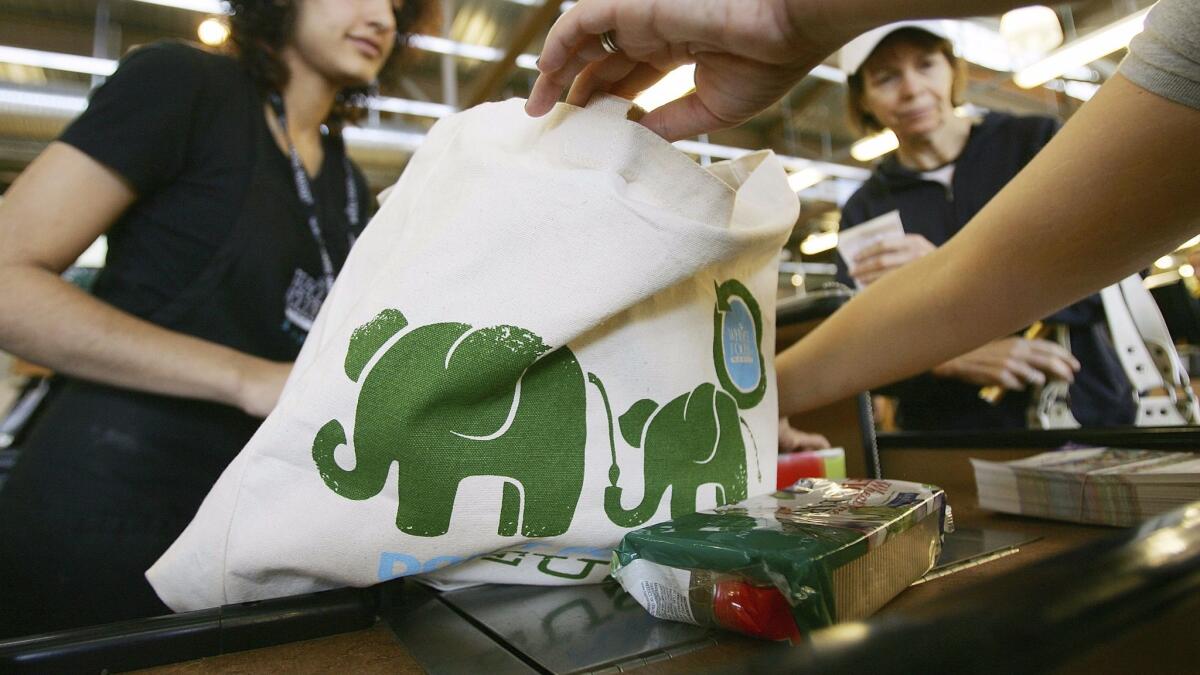Editorial: It’s been a year since California banned single-use plastic bags. The world didn’t end

- Share via
It’s been a year since Californian banned most stores from handing out flimsy, single-use plastic bags to customers. It was the first, and remains the only, U.S. state to do so. But guess what? In the end, this momentous change was not a big deal. Shoppers did not revolt or launch recall campaigns against state lawmakers. Food still gets to people’s houses. Reusable bags did not spark an epidemic of food-borne illnesses, as some critics suggested they would. Consumers didn’t go broke paying 10 cents apiece for the thicker, reusable plastic bags stores are allowed to distribute instead.
For the most part, Californians took in stride the sudden absence of some 13 billion bags that in previous years were handed out at grocery checkout counters and by other retailers of all sorts. Maybe a few grumbled at first about the inconvenience. But most adjusted quickly, perhaps because they intuited that something was not right about all those plastic bags hanging from trees, caught up in storm drains, clumped by the sides of freeways and floating in the ocean.
Although local bans already had cut down considerably on the plastic bag litter on beaches, the figure dropped further this year after passage of the statewide ban, preliminary data show. Plastic bags (both the banned and the legal variety) accounted for 3.1% of the litter collected from the state’s beaches during the 2017 Coastal Cleanup Day, down from to 7.4% in 2010.
The first year of the single-use plastic bag ban unfolded pretty much the way proponents had predicted. That’s an important lesson for next time.
So much for all the terrible things plastic-bag makers warned would happen during their multimillion campaign to persuade voters to reject the ban last November. In fact, this first year unfolded pretty much the way proponents had predicted. That’s an important lesson for next time.
And there must be a next time. Because although it took several years and a fierce political fight to accomplish, banning disposable plastic grocery bags (known as T-shirt bags because of their design) was just the first salvo in the battle to reduce disposable plastic waste. There is still far too much single-use plastic tossed out every day — heaps of beverage cups and lids, snack wrappings, potato chip bags, water bottles and take-out food containers.
Plastic litter isn’t just ugly to look at, it is a threat to the environment. As studies continue to show, plastic is accumulating rapidly in every corner of the natural environment. Plastic doesn’t biodegrade like paper. It breaks into smaller and smaller bits that are showing up in increasing numbers in oceans and lakes and are being eaten by sea birds and fish. There’s evidence that microplastics are creeping into our own food chain; it can contain toxins like Bisphenol A, an endocrine disrupter.
That’s reason enough to act quickly and decisively (though maybe not as extremely as Kenya, which has made trafficking in plastic bags a crime punishable by jail time). Encouraging people to recycle and not to litter can help, of course. But that’s not the ultimate answer to the plastic problem. Global plastic production has been increasing steadily and explosively since 1950, much of it in the form of things used once and then thrown away. Straws and drink stirrers alone accounted for 2.6% of the trash picked up on beaches this year.
Some disposable plastic is recycled at high rates, such as beverage bottles (though that has more to do with the fact that they are redeemable under the state’s bottle bill). Even then, there’s no guarantee that recyclables properly disposed of will actually be recycled. Then there are plastics that are non-recyclable or hard to recycle, such as polystyrene.
The California Legislature failed to pass a ban on polystyrene take-out containers last year — polystyrene includes hard plastic and plastic foam products — but the proposal got far enough to raise hopes that it will be reintroduced. No doubt it will be another tough political fight, but we hope that when faced with opposition from the lobbyists hired by plastics companies, lawmakers will remember that nothing bad happened when they banned plastic bags.
Happily, the march of local plastic bag bans continues across other cities and states — in Avon, Colo., Oak Park, Ill., and Coral Gables, Fla., to name just a few. It’s tough fighting an industry willing to drop millions of dollars to protect its interests, but California’s experience indicates that if the public understands what’s at stake, it will support the legislators brave enough to make the hard decisions.
Follow the Opinion section on Twitter @latimesopinion and Facebook
More to Read
A cure for the common opinion
Get thought-provoking perspectives with our weekly newsletter.
You may occasionally receive promotional content from the Los Angeles Times.










